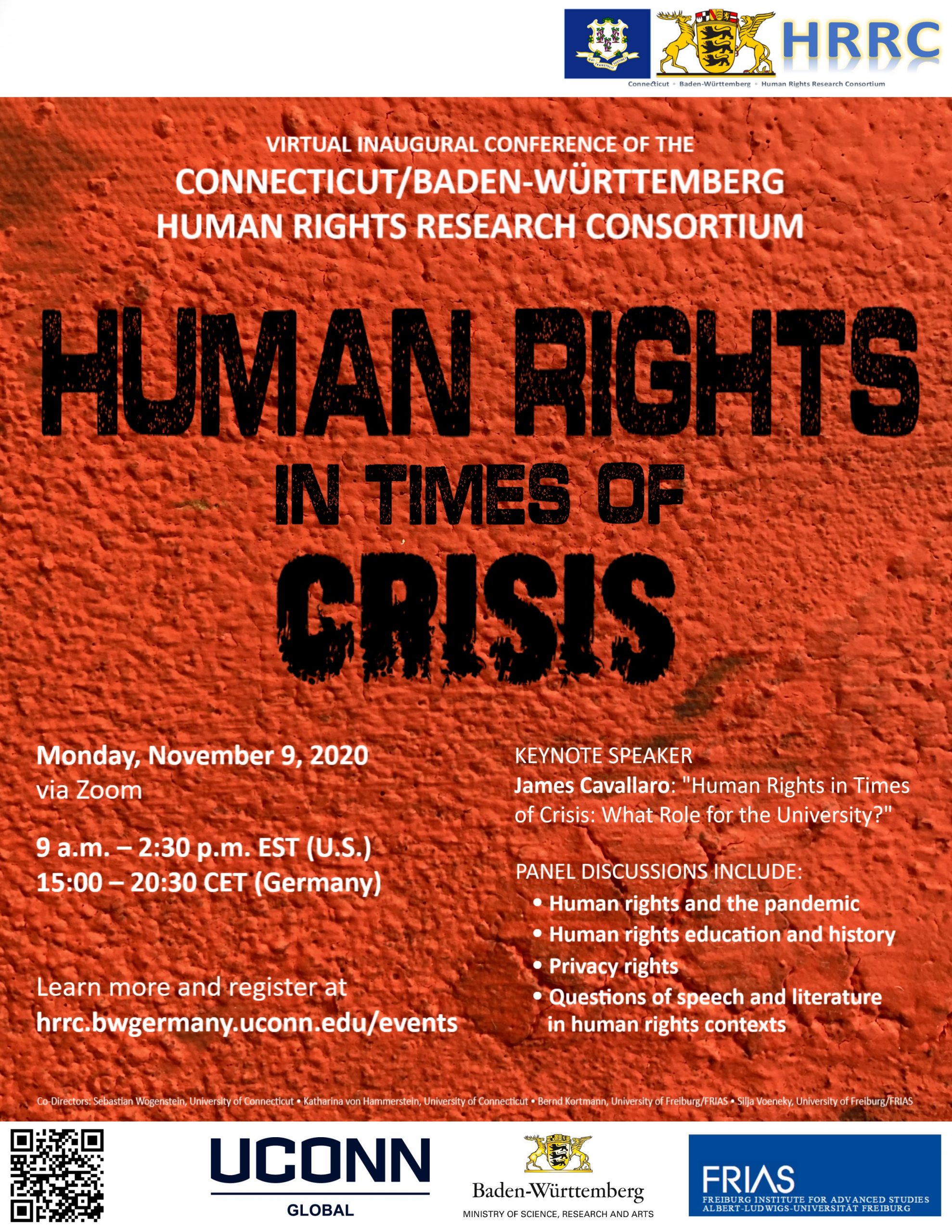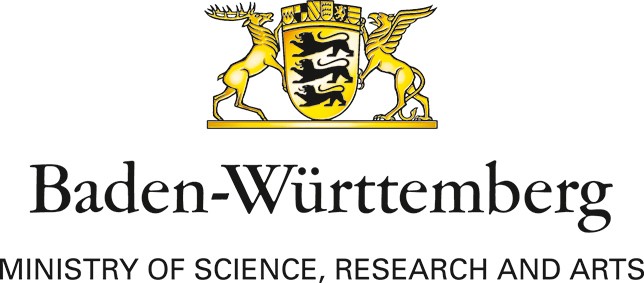Inaugural Conference 2020

Human Rights in Times of Crisis
November 9, 2020 via Zoom
9:00 am - 2:30 pm EST (U.S.) / 15.00 - 20:30 CET (Germany)
Introduction and Welcome
9:00 am EST / 15.00 CET
Co-Directors' Welcome: Sebastian Wogenstein, Silja Vöneky, Katharina von Hammerstein
- Minister Theresia Bauer, Ministry of Science, Research and Arts of the State of Baden-Württemberg
- Vice President Dan Weiner / Associate Vice President Yuhang Rong, Global Affairs, University of Connecticut
- President Kerstin Krieglstein, University of Freiburg
- Consul General Nicole Menzenbach, Consulate General of Germany, Boston
Co-Director Bernd Kortmann
Session A: Human Rights in Times of Crisis - Human Rights in Times of the Pandemic
9:30 am EST / 15:30 CET
Moderator: Bernd Kortmann, English, Freiburg Institute for Advanced Studies, University of Freiburg
“Human Rights in the Time of Covid-19”
Shareen Hertel, Editor-in-Chief, Journal of Human Rights, Political Science, Human Rights Institute, University of Connecticut
Sarah Willen, Co-Founder, Pandemic Journaling Project, Anthropology, Human Rights Institute, University of Connecticut
ABSTRACT:
As the COVID-19 pandemic emerged and deepened in mid-2020, the editorial team of The Journal of Human Rights quickly drew together a group of internationally recognized scholars across disciplines and regions to explore the scope of rights at risk. This presentation offers a preview of the special issue (JHR 19.5, due out in November-December 2020 from Taylor & Francis) and highlights the challenge of publishing quickly and inclusively as this crisis persists.
The Pandemic Journaling Project, a combined journaling (Tagebuch) platform and research study, lets anyone around the world create a weekly record of this turbulent time. From a research standpoint, the Project's baseline survey and weekly narrative prompts are crafted to “pre-design an archive” with durable research value. Contributors can download their journal securely and, if they wish, share individual entries on a curated Featured Entries page. An Educator Resource page outlines possibilities for engaging PJP in one's teaching.
10:00 am EST / 16:00 CET
Moderator: Achilles Skordas, Law, Max Planck Institute for Comparative Public Law and International Law, Heidelberg
“Torture in the Time of COVID”
David Richards, Political Science, Human Rights Institute, University of Connecticut
ABSTRACT:
The global COVID-19 pandemic has significantly impeded humans’ ability to live with dignity and to leverage those human rights created to protect human dignity. This presentation is based on a working paper examining how the pandemic has affected the right to be free from torture and ill-treatment in light of the twin crises (public health and economic) it has fomented.
Session B: Human Rights in Times of Crisis - Learning from the Past for the Future?
10:30 am EST / 16:30 CET
Moderator: Kathryn Libal, Human Rights and Social Work, Human Rights Institute, University of Connecticut
“Holocaust and Genocide Education at a Critical Juncture”
Avinoam Patt, Judaic Studies, Center for Judaic Studies and Contemporary Jewish Life, University of Connecticut
Glenn Mitoma, Education and Human Rights, Dodd Human Rights Impact, Human Rights Institute, University of Connecticut
Karin Amos, Education, Vice President of Academic Affairs, University of Tübingen
ABSTRACT:
In 2018, Connecticut became the 10th state in the United States to mandate Holocaust and genocide education in public schools. However, like most states, little public funding is provided to support educational efforts in this area. Avinoam Patt and Glenn Mitoma will discuss the political and educational challenges involved in promoting teaching of this critical topic at this critical time, amidst shrinking educational budgets, political uncertainty, rampant historical revisionism, and more.
11:00 am EST / 17:00 CET Coffee break with breakout rooms for informal conversation (30 minutes)
Session C: Human Rights in Times of Crisis - The End of Privacy?
11:30 am EST / 17:30 CET
Moderator: Silja Vöneky, Law, Freiburg Institute for Advanced Studies, University of Freiburg
“Privacy in Philosophical Perspective”
Elisa Orrù, Philosophy, University of Freiburg
ABSTRACT:
Times of crisis put increased pressure on human rights to be set apart for the realization of values considered more compelling, such as public health or security. Privacy is no exception.
The introduction of COVID-19 tracing apps in numerous countries across the world is a prominent example of how the collection and analysis of data under pandemic conditions have grown to a point unimaginable until only one year ago. In debates around tracing measures so far, most attention has been paid to the protection of data previously known only to the data subjects and their close contacts. This talk, by contrast, focuses on the protection of data already accessible in the virtual publicity of the internet or in physical public spaces. It draws on existing philosophical research on “privacy in public” and argues that privacy as a moral and social value deserves as much protection in public spaces as in private ones.
Response: Molly Land, Law, Human Rights Institute, University of Connecticut
Session D: Human Rights in Times of Crisis - Language and Literature
12:00 pm EST / 18:00 CET
Moderator: Niels Weidtmann, Philosophy, Center for Interdisciplinary and Intercultural Studies, University of Tübingen
“Toxic Speech, Expressive Freedoms, and Human Rights”
Lynne Tirrell, Philosophy, Human Rights Institute, University of Connecticut
ABSTRACT:
Concerns about toxic speech tend to focus on the speaker’s freedom of expression (1st Amendment to the U.S. Constitution) or the target’s right to equality (14th Amendment). Shifting focus, I briefly explore discursive harms as enacting threats to the human right to health.
12:30 pm EST / 18:30 CET
Moderator: Michael Pfremmer, Literatures, Cultures and Languages, University of Connecticut
“Theses on Human Rights, Crisis and the Role of Literature”
Florian Kastner, Literatures, Cultures and Languages, University of Connecticut
ABSTRACT:
What is the role of literature in times of crisis? Is the fictional text affecting our reality? A selection of theses will address possible impact on societies and communities in which a state of emergency has become a daily condition.
12:45 pm EST / 18:45 CET Lunch / Dinner break with breakout rooms for informal conversation (30 minutes)
Keynote Lecture
1:15 pm EST / 19:15 CET
Moderator: Frauke Lachenmann, Law, Max Planck Foundation for International Peace and the Rule of Law, Heidelberg
“Human Rights in Times of Crisis: The Role of the University”
James Cavallaro, Law, University Network for Human Rights
ABSTRACT:
The world faces a series of grave challenges—impending climate catastrophe, the rise of ethnonationalism, hyper-polarization of wealth and widespread violation of human rights. In this context, what should we expect—indeed, demand—of our educational institutions? This talk examines the role of the university in fostering our current crises and proposes directions for reconceptualizing centers of higher education as advocates for human rights and bulwarks against authoritarianism.
Response: Samuel Moyn, History and Law, Yale University
2:15 pm EST / 20:15 CET
Closing Remarks



